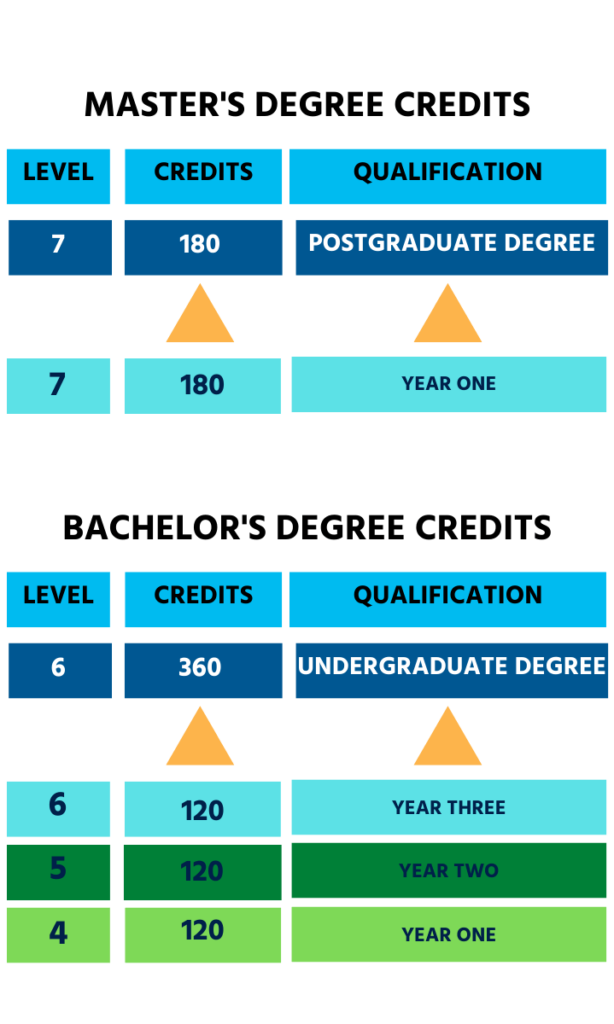Undergraduate and Postgraduate Study Compared
Use this quick guide to understand and compare the main differences between undergraduate and postgraduate study.
But before we start, let’s quickly cover how most people outside of academia refer to the different levels. In general, most people refer to undergraduate degrees as just “degrees” and use “master’s” for postgraduate degrees. We will use both these terms in the post below.
1- Level of Study
A degree is typically taken before a master’s. In very particular situations, it is possible that a person can take a master’s without completing an undergraduate degree, but this is uncommon.
In the UK, an undergraduate degree is a level 6 qualification, and postgraduate courses are level 7.

2- Learning Experience
As a general rule, an undergraduate degree is a broader learning experience. Therefore, students cover more areas and topics to build a solid foundation and develop ideas in the subject.
Postgraduate courses tend to focus on one topic in greater detail. You could say that an undergraduate degree is a broader shallower learning experience compared to a narrower, deeper investigation on a postgraduate course. Undergraduate courses are designed to develop a well-rounded level of understanding, principles and expertise in the subject area. In comparison, postgraduate courses build advanced knowledge in the subject and push a student’s research skills.
A postgraduate student is expected to be able to engage in the subject area meaningfully and be able to substantiate their ideas and arguments. In addition, postgraduate level students are expected to be far more self-directed and independent than at undergraduate study.
3- Research Skills
Both undergraduate and postgraduate study involves independent research methods. Undergraduate students spend their first two years of study building up to an independent piece of research in the final year. Postgraduate students are expected to be more independent in their research, go much deeper into the subject and produce a more extensive dissertation or research project.
4- Course Length
An undergraduate bachelor’s degree takes three times longer to complete than a postgraduate degree. A standard UK degree takes three years of full-time study, with each year made up of 120 Credits. This compared to one year of full-time study made up of 180 credits on a postgraduate master’s degree.

5- Academic Year
At UK universities, the academic year is split into three terms. On full-time undergraduate degrees, the number of weeks in an academic year is 39 compared to 45 weeks on postgraduate programmes. These extra weeks of study are over the summer holiday period. The exact number may vary between universities.
6- Contact Hours
On postgraduate courses, students can expect less interaction with their tutors and more time spent on independent research and learning. There are no lectures on a research master’s, and the entire course is devoted to investigating a particular subject. On a taught master’s, there are lectures and tutorials in the same way as on a bachelor’s degree, but students are expected to be more independent in their studies.
7- Dissertation Length
The level and depth of investigation are more significant on a master’s degree compared to a bachelor’s degree. The dissertation is around 10,000 words for undergraduate degrees, with master’s degree dissertations around 15,000 words.
On taught master’s degrees and bachelor’s degrees, it is possible to complete the course without submitting a dissertation. In the case of an undergraduate degree, if students do not complete a dissertation, they are not awarded the honours part of the degree title. Students studying for a postgraduate degree can leave the course after 60 or 80 credits with a Postgraduate certificate or diploma, respectively.
8- Course Fees
In the UK, the government caps the fees universities can charge for undergraduate bachelor’s degrees. Most UK universities charge a similar amount for undergraduate courses at or slightly below the government cap. However, some online degrees set their fee at a lower rate.
In contrast, there is no government-regulated fee cap for postgraduate courses. As a result, the cost of a master’s degree can vary significantly between institutions and even between courses at the same university. As universities have much more freedom to set, the price fees can be based on a number of factors, from the actual costs of teaching a course to the perceived value and quality of the institution or certificate type.
Due to these factors, a master’s degree cost can vary from £6,000 to over £40,000 for some MBAs.
9- Entry Requirements
Undergraduate degrees require a level 3 qualification for entry. For students going straight into Higher education from college, at least three A levels are needed. However, for mature students, there are other pathways to start an undergraduate degree, such as access courses.
To gain admission to postgraduate degrees, applicants typically need to have completed an undergraduate degree. A difference between undergraduate and postgraduate admissions is that many postgraduate courses require relevant work experience.